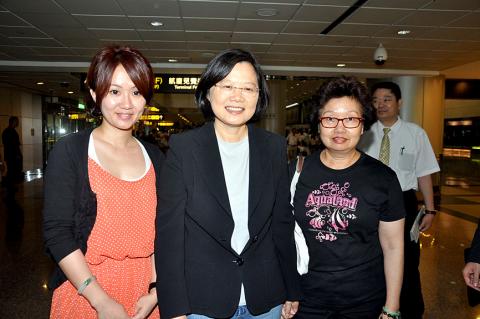Seeking to assuage apprehensions about the future of cross-strait relations, Democratic Progressive Party (DPP) Chairperson and presidential candidate Tsai Ing-wen (蔡英文) yesterday reaffirmed her party’s willingness to hold talks with Beijing.
Concluding a three-day visit to the Philippines, Tsai made the remarks during a breakfast meeting with reporters.
The DPP, she said, was willing to sit down with China to discuss proposals for building a “feasible and viable” interaction framework between the two sides, adding that the talks would not come at the expense of the DPP’s political values and principles.

Photo: CNA
Tsai said she “welcomes [Chinese] officials to visit the DPP’s headquarters or its think tank,” referring to the New Frontier Foundation, where recent talks with foreign experts have been held.
“The DPP’s door is wide open with regards to China. We hope that through more interaction we can increase our mutual knowledge of one another and lower to the minimum any risks of a misunderstanding,” she said.
Tsai said that if the DPP regained the presidency next year, its cross-strait policy would be more transparent and involve more input from the public.
The legislature would also be given a chance to monitor such agreements, she said.
A former Mainland Affairs Council chairperson, Tsai also defended the consistency of her China policies.
Critics have accused her of holding ideas that are less than pragmatic and seeking to isolate Taiwan from Beijing, despite a booming Chinese market. She has also been accused of being unclear on how the DPP would handle the Economic Cooperation Framework Agreement, a trade deal signed with China in June last year.
“I have always been very clear on how I handle cross-strait relations. Some people believe that I’m unclear only because they have purposely not closely studied my [policies],” Tsai said.
Tsai also addressed the dispute over the Spratly Islands (南沙群島) — the rich fishing grounds claimed in part by Taiwan, China, Brunei, Vietnam, the Philippines and Malaysia — during her morning discussion.
Taiwan, she said, needed to make clear its separateness with China, especially on sovereignty over the islands. She remained non-committal on whether Taiwan should work together with its cross-strait neighbor to resolve sovereignty disputes.
“Taiwan has its own motives on the Spratly Islands dispute — and the basis of that is Taiwanese sovereignty — separate from China,” she said.

NATIONAL SECURITY THREAT: An official said that Guan Guan’s comments had gone beyond the threshold of free speech, as she advocated for the destruction of the ROC China-born media influencer Guan Guan’s (關關) residency permit has been revoked for repeatedly posting pro-China content that threatens national security, the National Immigration Agency said yesterday. Guan Guan has said many controversial things in her videos posted to Douyin (抖音), including “the red flag will soon be painted all over Taiwan” and “Taiwan is an inseparable part of China,” while expressing hope for expedited “reunification.” The agency received multiple reports alleging that Guan Guan had advocated for armed reunification last year. After investigating, the agency last month issued a notice requiring her to appear and account for her actions. Guan Guan appeared as required,

Japan and the Philippines yesterday signed a defense pact that would allow the tax-free provision of ammunition, fuel, food and other necessities when their forces stage joint training to boost deterrence against China’s growing aggression in the region and to bolster their preparation for natural disasters. Japan has faced increasing political, trade and security tensions with China, which was angered by Japanese Prime Minister Sanae Takaichi’s remark that a Chinese attack on Taiwan would be a survival-threatening situation for Japan, triggering a military response. Japan and the Philippines have also had separate territorial conflicts with Beijing in the East and South China

A strong cold air mass is expected to arrive tonight, bringing a change in weather and a drop in temperature, the Central Weather Administration (CWA) said. The coldest time would be early on Thursday morning, with temperatures in some areas dipping as low as 8°C, it said. Daytime highs yesterday were 22°C to 24°C in northern and eastern Taiwan, and about 25°C to 28°C in the central and southern regions, it said. However, nighttime lows would dip to about 15°C to 16°C in central and northern Taiwan as well as the northeast, and 17°C to 19°C elsewhere, it said. Tropical Storm Nokaen, currently

PAPERS, PLEASE: The gang exploited the high value of the passports, selling them at inflated prices to Chinese buyers, who would treat them as ‘invisibility cloaks’ The Yilan District Court has handed four members of a syndicate prison terms ranging from one year and two months to two years and two months for their involvement in a scheme to purchase Taiwanese passports and resell them abroad at a massive markup. A Chinese human smuggling syndicate purchased Taiwanese passports through local criminal networks, exploiting the passports’ visa-free travel privileges to turn a profit of more than 20 times the original price, the court said. Such criminal organizations enable people to impersonate Taiwanese when entering and exiting Taiwan and other countries, undermining social order and the credibility of the nation’s